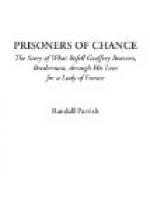“No,” I answered, already deeply interested in his simple story. “That was all before my time, nor do I even remember hearing the name till now, yet there were Frenchmen upon the great river full a hundred years ago, I have been told. ’Twas most likely they who came to your people. Did they do harm to your fathers?”
“They passed away in peace,” he continued, using the language with greater ease as he proceeded, “for we were then strong, and of courage in battle; the fire bright on our altars. Nor did we look again upon any white face for so long a time that this visit became no more than a tradition among the people. More and more did the fathers believe this Tonty was a visitant from the Sun—many there were who worshipped him as a god. When he left he said he would come again, and with every sunrise the eyes of my people were turned in watching up the river. Then, when I was but a child, there came to our village canoes from below, from the way of the salt water. They did land, unmolested of our people, who supposed Tonty had come back; fair-faced men with yellow hair and beards and dressed in shining metal from head to heel. I was at the shore with the others when they came, and heard them speak in this tongue, and call themselves Francais. Others of that race followed, and we welcomed and fed them all, even as our fathers had done to Tonty. Some were warriors with swords, and fire-sticks, but with these were also some strange, black-robed men, who sought to tell us of another God, greater than the Sun our fathers worshipped. They had pictures, and crosses of wood, and prayed to these as we to the Sun. But we believed not in their God, and tried to drive them away from our village when they put out our fires, for they made much trouble among our people, so that the priests came to hate them—the black-robes. Some among them went, but one would not go, and so we made offering of him in sacrifice to the Sun. Then we thought we were rid of the black-robes, and could again live as we had been taught of our fathers.”
He stopped speaking, his head bent low on his breast, his eyes on the altar name. I waited without a word.




